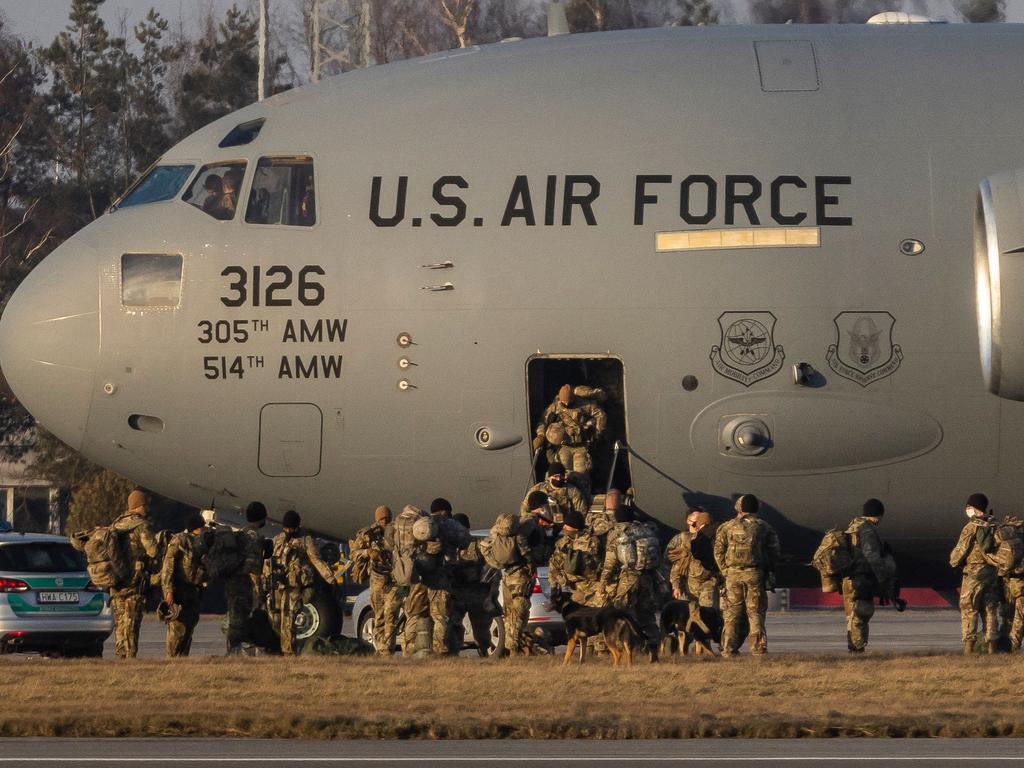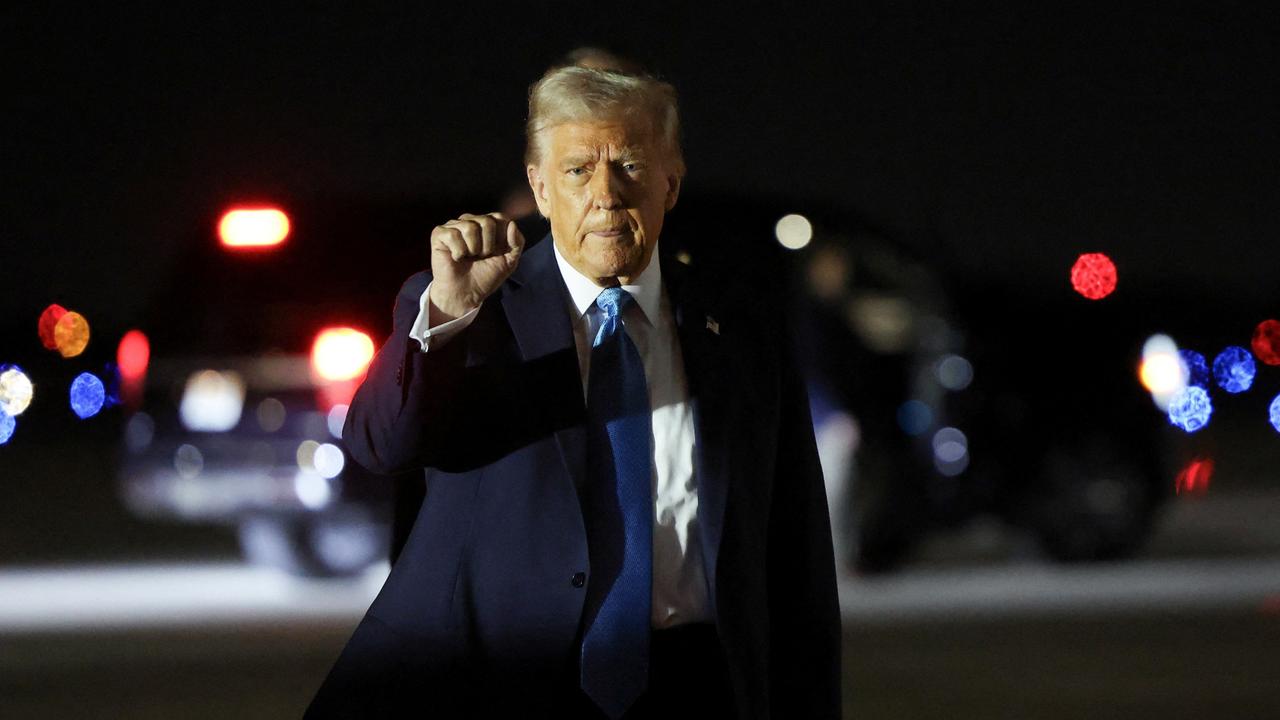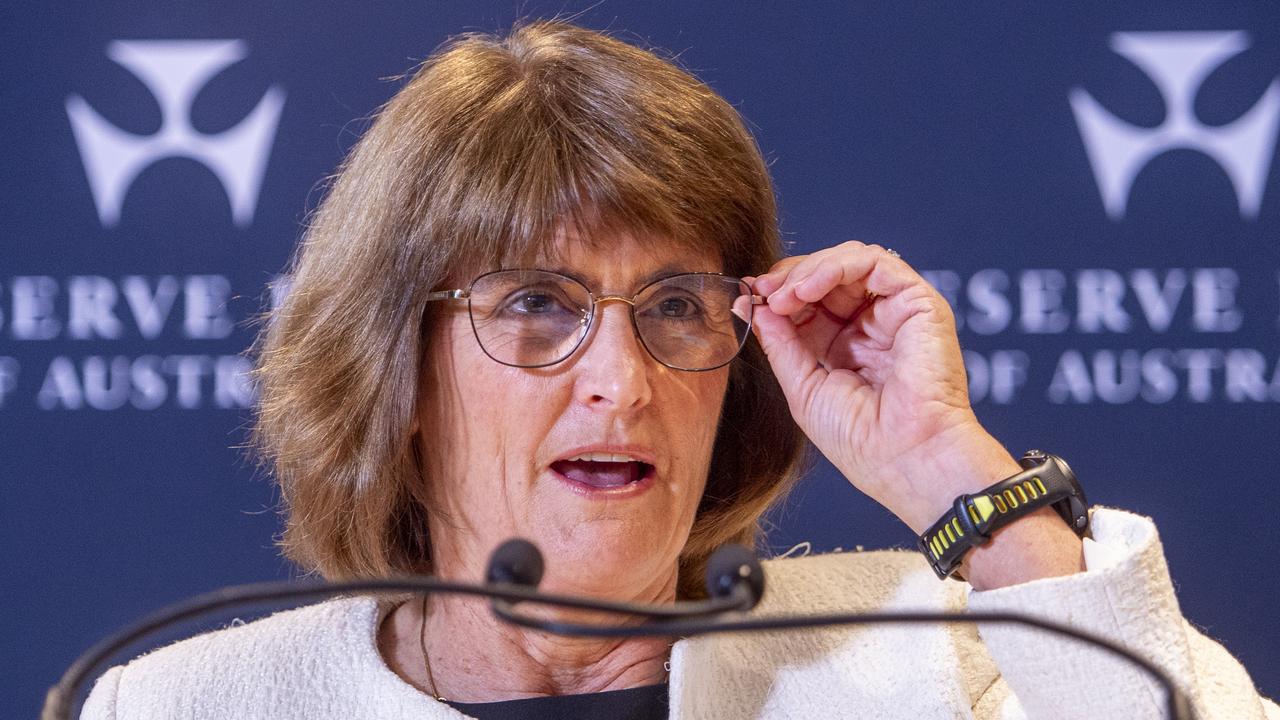East Ukraine rebels mobilise troops, Kamala Harris warns of Moscow ‘deception’
NATO has removed its staff fro Kieve as Russian-led breakaway regions accuse Kiev of an imminent attack and Moscow tests missile.
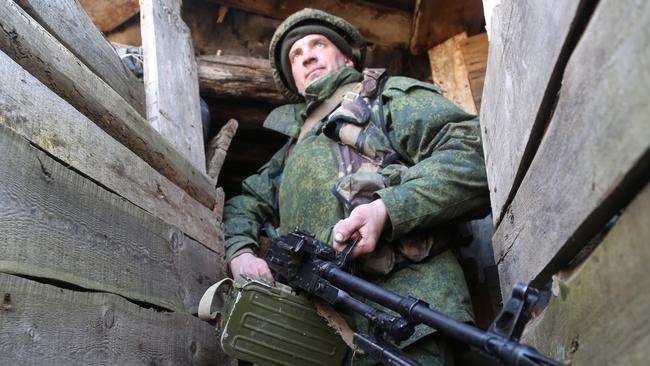
The Russian-led breakaway regions of eastern Ukraine mobilised able-bodied men against what they said was an imminent attack by Kiev, as shelling across the front line intensified, killing two Ukrainian soldiers.
Kiev dismissed the call-up and moves to evacuate civilian residents of Russian-held Donetsk and Luhansk areas to Russia as a provocation. “It’s a fake mobilisation in response to a fake threat,” said Ukrainian Interior Minister Denys Monastyrski, who came under shelling near the front line on Saturday. “What they are trying to do is to create panic and fear, also on our side and among our people.”
Russian-installed authorities in Donetsk and Luhansk on Friday night instructed the areas’ women, children and elderly to leave for Russia, organising convoys of buses. On Saturday, Denis Pushilin, head of the self-proclaimed Donetsk People’s Republic, ordered the general mobilisation of men between 18 and 55 years old, including reservists, telling them to report to enlistment offices. Men of that age were banned from leaving the enclave.
“I appeal to all the men of the Republic, who are able to hold weapons in their hands, to stand up for their families, their children, wives, mothers,” Mr. Pushilin said in a televised address. Russian-installed authorities in Luhansk announced a similar decision.
Ukraine denies it has any plans to recapture by force the parts of Donetsk and Luhansk that Russian-backed forces seized in 2014. President Biden has said that he expected his Russian counterpart Vladimir Putin to invade Ukraine in the coming days, with targets including the Ukrainian capital.
While until last week there was an average of five-six daily shelling and firing incidents along the front line, the number has surged more than 10-fold in the last three days, said Lt. Gen. Oleksandr Pavliuk, the commander of Ukrainian forces in Donbas. “The enemy artillery is shooting from behind civilians,” he said. “And, in accordance with our principles, we do not fire back at civilians.”
Washington has warned that Moscow is looking for an excuse to start hostilities in Donbas, where roughly 14,000 people have died in fighting since Russia fomented a separatist uprising there in 2014, sending weapons and troops.
NATO is also relocating staff from Kiev to Lviv, in the west of the country, and to the Belgian capital Brussels for their safety, an alliance official said Saturday.
Mr. Monastyrski said that, according to Ukrainian intelligence, Russian mercenaries from the Wagner group have arrived in Donetsk and Luhansk with orders to blow up critical infrastructure and pin the blame on Kiev. The claim couldn’t be independently confirmed.
Shelling could be heard Saturday in Stanytsia Luhanska, the Ukrainian-controlled town where the only crossing point between Russian-held parts of Donbas region and Ukrainian controlled-areas operates daily. So far, the crossing remained open, with more than 840 people, mostly women and children, traversing the front line to enter Ukrainian-controlled areas on Saturday, according to Ukrainian border officials. Some 50 fighting-age men were prevented by Russian-installed officials from leaving, these officials said.

Images released by Russia’s Defence Ministry on Saturday showed Russia test-launched ballistic and cruise missiles in what it described as strategic deterrence exercises. President Vladimir Putin oversaw the launches from a command centre, according to a Kremlin pool report. Photo: Russian Defense Ministry/AFP via Getty Images
“Of course, some of the people who cross this way are nervous and afraid, but we don’t see any panic so far,” said the Ukrainian governor of Luhansk region, Serhii Haidai, who was visiting the town. He said that Russian authorities have started amassing heavy weapons on the other side of the front line.
Ukrainian authorities were preparing plans for evacuating civilians from towns within Russian artillery range, like Stanytsia Luhanska, should violence continue. Schools in those areas will operate remotely after shelling hit a kindergarten in Stanytsia Luhanska and an elementary school in a nearby town on Thursday, Mr. Haidai said. Ukraine and the U.S. blamed Russia for the shelling, which injured three staff. None of the 20 children in the building at the time were hurt when an artillery round punched through the brick wall of a recreation room.
Speaking next to a crater caused by one of the shells in the courtyard of the Stanytsia Luhanska kindergarten, Iryna Vereshchuk, Ukraine’s deputy prime minister and minister for the reintegration of occupied territories, said Moscow sought to create panic in Russian-held parts of Donetsk and Luhansk by spreading false plans of an alleged Ukrainian offensive and by staging explosions there.
“What they need is fear,” she said.
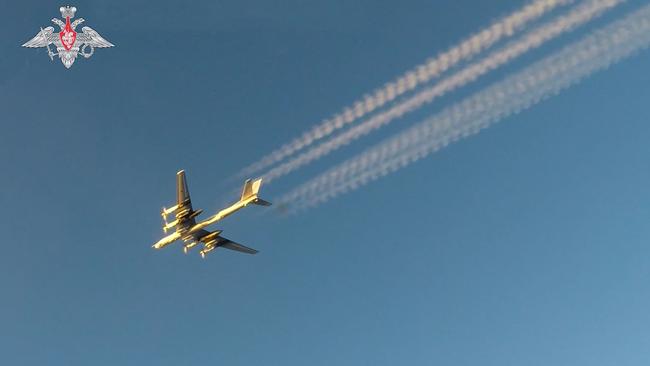
Ms Vereshchuk added that Kiev didn’t expect Russia to openly invade Ukraine imminently. “Our intelligence doesn’t confirm this. Yes, there are steps toward a certain escalation — you can hear shelling with your own ears — but that doesn’t mean that a full-scale invasion is being prepared. What our intelligence does confirm is that Russia is seeking to create provocations.”
Ukraine, she said, had no intention of retaking Russian-controlled areas by force. “We cannot start shooting peaceful residents,” she said.
Col. Oleksii Vukolov, the deputy commander of the Ukrainian military’s Northern Command in Donbas, said the situation along the front line was tense but stable on Saturday.
“We observe the agreements and do not respond to fire. They are trying to provoke us to shoot back, so that they could say that the temporarily occupied areas are being assaulted,” Col. Vukolov said. “Our children are behind our backs, and we must defend them so they can live on this land in peace.”
The U.S. has warned that a massive Russian attack is in the making as Moscow deployed between 169,000 and 190,000 military personnel near Ukraine and in Crimea, up from a force of 100,000 on Jan. 30, according to Michael Carpenter, the U.S. ambassador to the Organisation for Security and Cooperation in Europe.
Russia denies that it plans to invade its neighbour, but in recent days its proxies in Donbas have accused Ukrainian forces of launching assaults on their territory, including shelling residential locations and infrastructure, such as gas pipelines and power plants. Kiev, in turn, has said that it is facing provocation and has accused the Russian-led forces of bombardments by artillery, tank and mortar fire. On Thursday, the Ukrainian authorities and the U.S. blamed Russia for shelling the kindergarten in Stanytsia Luhanska.
Two Ukrainian soldiers were killed in the shelling on Saturday and four were injured, Ukraine’s Defence Ministry said.
Beyond Donbas, tensions continued to grow. On Saturday, Mr. Putin personally oversaw military ballistic and cruise-missile drills alongside Belarusian leader, Alexander Lukashenko, the Kremlin reported. Russia’s Defence Ministry described the drills as strategic deterrence exercises, planned earlier “to test the readiness of military command and control agencies … as well as the reliability of weapons of strategic nuclear and non-nuclear forces.”
The White House National Security Council tweeted early Saturday that it had linked Russia’s military intelligence apparatus, the GRU, to cyberattacks this week intended to disrupt internet service in Ukraine. “Known GRU infrastructure has been noted transmitting high volumes of communications to Ukraine-based IP addresses and associated banking-related domains,” the tweet said.
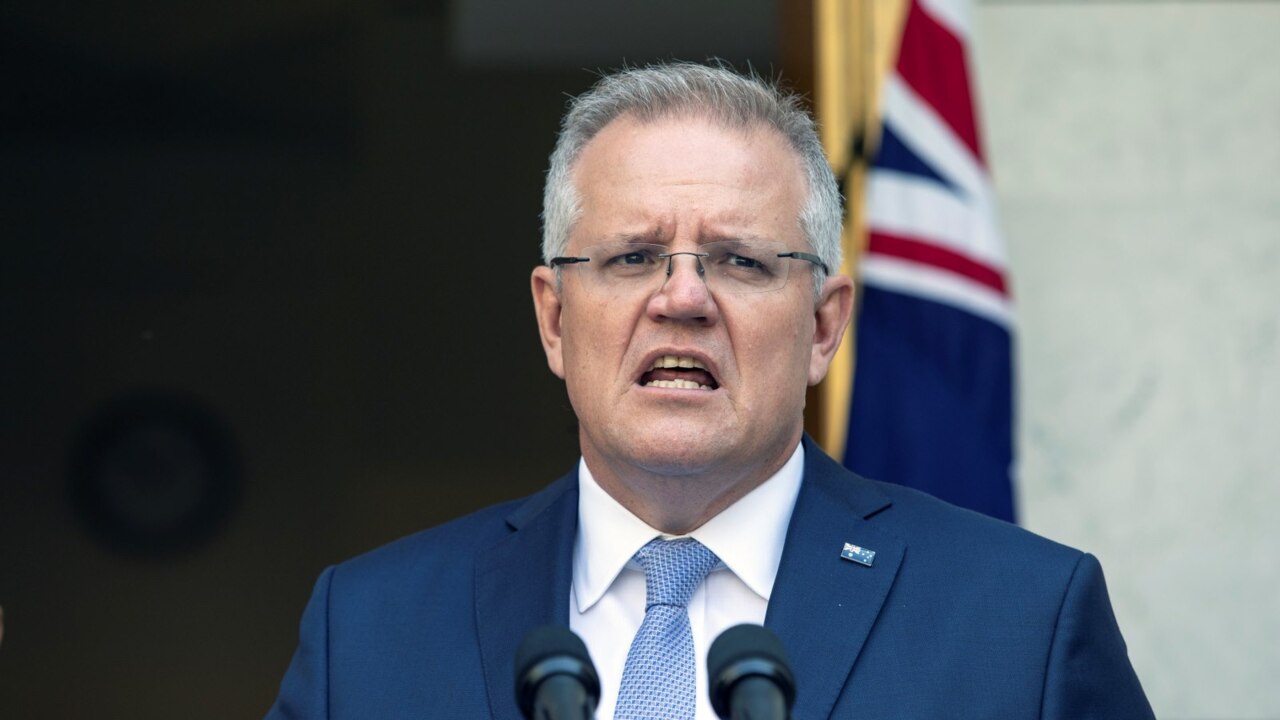
Vice President Kamala Harris on Saturday warned that Russia’s actions were making a diplomatic solution harder to reach, while Russian President Vladimir Putin oversaw tests of his country’s ballistic and cruise missiles.
Ms Harris spoke of the “dire circumstances” in which Western officials were gathering in Munich for Europe’s pre-eminent annual strategic forum. She accused the Kremlin of spreading “disinformation, lies and propaganda.” On Friday, President Biden said that he expected Mr. Putin to launch a Russian invasion of Ukraine in the coming days, with targets including the Ukrainian capital, Kiev.
Strains again emerged between Western leaders over how to de-escalate the crisis, with German Chancellor Olaf Scholz warning that Russia’s next steps in the crisis remained uncertain.
Facing a test of her diplomatic skills, Ms. Harris, who had little foreign-policy experience before taking office last year, said a solution to the crisis was still open.
U.S. Secretary of State Antony Blinken is due to meet Russian Foreign Minister Sergei Lavrov on Feb. 23.
During her 40-minute meeting with Mr. Zelensky, Ms. Harris said the U.S. had rallied its allies in support of Ukraine. The U.S. has delivered defensive weapons to Ukraine and offered financial support but it has made clear it won’t fight militarily in Ukraine.
“We do clearly understand what is going on. This is our land, and the only thing we want is to have peace, bring the peace back to our country, ” Mr. Zelensky told the vice president.
In her speech, Ms. Harris said Russia was following a playbook of aggression the West has seen before, where the Kremlin will “create false pretext for invasion and it will amass troops and fire power in plain sight.” “Russia continues to claim it is ready for talks while at the same time it narrows the avenues for diplomacy,” she said. “Their actions simply do not match their words.”
Ms Harris praised European and U.S. resolve in drawing up sweeping economic sanctions and export controls that would target Russian financial institutions, key industries and those who are complicit in or “aid and abet” an unprovoked invasion of Ukraine.
“I will answer the sceptics and those seeking to test us,” she said. “Our strength must not be underestimated.” Germany’s new chancellor, Mr. Scholz, struck a different note, even as he dismissed Russia’s accusations of Ukrainian “genocide” against pro-Moscow separatists and called Russia’s military and naval build-up threatening its neighbour “an undeniable fact.” He said, “It will always be our task … to use any openings, however minor they may be, in order to open the road towards negotiations,” adding, “Everyone who is here will not be in a position to forecast what is going to happen. Those who were to dare to do so would be giving into hubris.” Mr. Scholz echoed a theme that he struck in Moscow earlier in the week when he met Mr. Putin — that Ukraine is many years away from even being considered for membership in the North Atlantic Treaty Organization and that this reality could help inform Western efforts to find a diplomatic solution.
“NATO membership is not on the agenda,” he said. “This is what we have to make clear when we talk to different parties to” de-escalate the crisis.
But Poland’s Prime Minister Mateusz Morawiecki said it was naive for Western leaders to believe that offering concessions to Russia would lead to a “peaceful cohabitation.” “I know people in the West think so, but you don’t know Russia — they don’t think so.” he said.
Mr. Zelensky used the occasion to press his country’s case to move closer to NATO and the EU.
Since the annexation of Crimea, Russia has been trying to convince Ukrainians that “nobody is waiting for us in Europe,” he said. “Isn’t it Europe that should be saying and proving them wrong?” Mr. Zelensky said the standoff in eastern Ukraine was potentially explosive, with Russian-backed forces trying to tempt Ukrainian into firefights on the front lines with daily artillery strikes and shootings. But he played down U.S. warnings that a Russian invasion was in the offing, voicing fears that talk of war could ruin Ukraine’s economy.
“We need to keep calm and be adults,” he said. “And in these times, the Ukrainian army is more adult than others.”
Dow Jones

